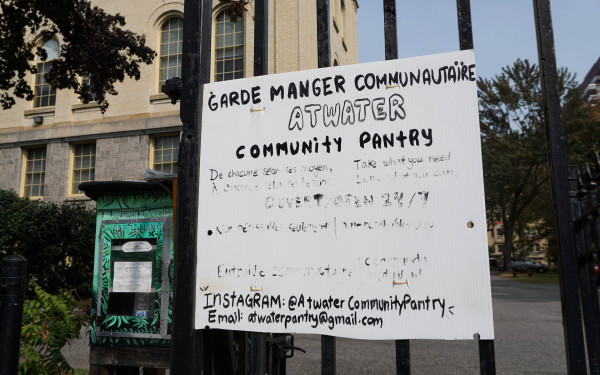Streamlining Today, Privatization Tomorrow at Canada Post
Dissecting Ottawa’s Neoliberal Crusade Against Public Industry
Plans to streamline Canada Post, amid a reported fiscal deficit, have been in the process of implementation for several months now. Canada Post delivered approximately 9.4 billion pieces of mail in 2013, around 63 per cent of which was through a door-to-door or a to-apartment-building service. However, the changes they are making—by decree, without consultation—will lead to the total replacement of this service with community mailboxes in an effort to reduce costs.
At the same time, there will be a 35 per cent rise in the price of stamps and job cuts amounting to between 6,000 and 8,000 positions over the coming years. Canada will be the first country in the G8 to entirely eliminate door-to-door service. “Jobs are not at risk, our workers have job security. […] However, over time, we will be reducing positions,” Canada Post spokesperson Jon Hamilton told The Link.
In 2014, Canadians sent 1.5 billion fewer letters than they did in 2006, according to Hamilton. In order to avoid becoming “a drain on the taxpayer,” these reforms are a necessity, he said. One wonders, though, how Canada Post could become a drain on the taxpayer when it isn’t subsidized by the state.
I spoke to Alain Duguay, president of the Canadian Union of Postal Workers’ Montreal local, to help clarify the supposed necessity of these reforms. He disagrees with Canada Post’s dire prediction of deficits ahead. He said 2014 will be the most profitable year in Canada Post’s history; and the cuts are an “ideological decision,” not a financial one.
“In 2012, Canada Post predicted that by April 2013, they will be facing a deficit of $250 million. In fact, Canada Post made $94 million [in] profit,” explained Duguay. “Canada Post is claiming that due to the $250 million deficit in 2012 they will be facing a deficit of $1 billion in 2020. That’s not true. [..] The only reason that there was a deficit in 2011 was because there was an industrial dispute between the office workers of Canada Post and the organization over equity pay, in a case stretching back 31 years, which resulted in Canada Post having to put aside $200 million for repayments,” he added.
Duguay also pointed out that Deepak Chopra, the current president and CEO at Canada Post, was formerly the CEO and president of Pitney Bowes, a privately owned company selling postal equipment. Chopra is “of course in favour of privatization,” Duguay said.
Montreal Mayor Denis Coderre has spoken out against the discontinuation of door-to-door service. He told La Presse that “reduced-mobility persons and the elderly need this service.” Indeed, at least one in 10 Quebecers live with a disability and far more have mobility issues: this plan will affect those individuals most harshly. Those with limited mobility will have to provide Canada Post with their medical record if they would like to have their mail delivered to their home once a week. Duguay described this as “illegal.”
One wonders if the reforms at Canada Post are part of a strategy to eventually privatize the company. What does a Crown corporation do before it is privatized? Well, it streamlines, reduces costs, reduces services and transforms itself into a more skeletal and profitable model. Moya Greene, who served as president and CEO of Canada Post from 2005-2010, later went on to oversee the privatization of the United Kingdom’s Royal Mail. The UK government came under widespread criticism as the value per share rose 80 per cent in the weeks immediately following the start of trading.
“Another key fact to include is that the cuts [at Canada Post] are premised on a Conference Board of Canada report which has so far failed in every single one of its predictions,” said a source at the CUPW, noting that the report concluded the corporation would lose money in 2012 through 2014.
“The current CEO of Canada Post sits on the Conference Board and Canada Post funded the report, which has been claiming—erroneously, if its mistakes in prediction to date are anything to go by—that it will lose $1 billion by 2020,” said a source at the CUPW.
“The current CEO of Canada Post sits on the Conference Board and Canada Post funded the report, which has been claiming—erroneously, if its mistakes in prediction to date are anything to go by—that it will lose $1 billion by 2020,” they said. “Therefore Canadians are being duped into believing the cuts are necessary as this billion-dollar figure has been widely broadcast.”
André Frappier, a former president of CUPW’s Montreal local and Québec solidaire candidate for Crémazie, says parcel service “increases by the day” and helped Canada Post “to reach record profits this quarter.” He argues that Chopra and the Harper government “are determined to dismantle our public postal service, whatever the cost may be for communities across Quebec and Canada.”
The CUPW has presented alternate ideas for increasing revenue, such as providing passport and banking services at Canada Post which, with 6,519 distribution and service points, has unparalleled reach across the country. While Greene was CEO of Canada Post, she ordered a study into the feasibility of banking services that found that the Crown corporation could “profitably launch the largest banking network in the country.” Only 110 of the report’s 811 pages were ever disclosed, suggesting that Canada Post is determined to streamline even if expansion would be profitable, saving jobs in the process.
Ultimately, the plan to end door-to-door service is purely ideological and will only result in a much-depreciated service to the public for a much higher price, as Canada Post is downsized to prepare it for privatization. When I asked Hamilton if Canada Post will remain a Crown corporation, he answered, “We have a mandate to serve every Canadian in a financially self-sufficient manner, and we will continue to do so.” I’m personally very skeptical.
Investors typically prefer to invest in the most streamlined, profitable model. These reforms seem to have prepared this public industry for such a process. Canada Post is clearly making a profit. This is just another case of a flawed, dehumanized neoliberal logic that thinly veils the selfish profit-seeking motive of our democratically elected officials and their appointed cronies who lobby for their previous employers.
Canada Post has made a profit in 17 of the last 18 years. Hamilton claims “treading water won’t get you out of the deep end, and that’s what we’re doing with our five-point plan [as post by letter declines],” but I believe that this is merely an excuse for private companies to muscle and lobby their way into pillaging the fruits of public industry.



_1_600_375_90_s_c1.jpg)

_600_375_s_c1.png)
